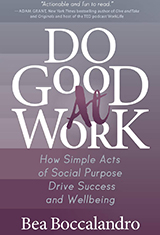Helping others: a key to (re)motivation
It’s not easy to stay motivated and driven while we are going through a pandemic, when our movements are restricted and we’re working from home. However, helping others increases our sense of well-being, pumps up our morale, remobilizes our energy, and helps us through these tricky times more easily.
The health crisis has thrown us all off course. Do you feel frustrated by the unprecedented restrictions that are threatening your business? Are you disorientated by the lack of visibility? Demotivated by the endless and constantly changing stream of rules? What if you fought back against the prevailing doom and gloom by doubling up on empathy? Because this is a virtue that doesn’t just benefit others; it also benefits you. And despite what many think, your job is the perfect place to put this into action. Doing good at work isn’t an outlandish concept for idealists, nor is it a luxury reserved for a disconnected elite – or even a superhuman effort requiring you to sacrifice all other ambitions.
On the contrary, it really drives resilience and motivation – and anyone can do it. Whether you are in a leadership position or not, whatever your job, acting for the good of others can help you get through the current situation in a positive way. So do yourself a favor by doing favors for others!

Do Good at Work: How Simple Acts of Social Purpose Drive Success and Well-being
Bea Boccalandro, (Morgan James Publishing, 2021).
Your job is the cornerstone of your self-esteem
Your job has a direct and tangible impact on your well-being. According to a 2019 survey,1 if you’re not satisfied with your job, there’s a 68 percent chance you’re not satisfied with your life either. Inversely, if you’re happy at work, the probability of your being content in your life rises to 79 percent. It’s hardly surprising; you devote most of your waking hours to your job and call on most of your skills while you are at work.
So why is work so often the source of dissatisfaction? To put it bluntly, because today’s businesses still believe that paychecks and bonuses drive motivation. However, as demonstrated by Daniel Kahneman, a winner of the Nobel Prize in economics, once basic financial security is assured, material advantages are no longer effective motivators. Once your annual salary exceeds $75,000 (€63,000), additional income does not increase happiness.2
So doing good at work is your primary source of satisfaction …
Your paycheck is at the bottom of the workplace motivation pyramid (inspired by Abraham Maslow’s hierarchy of needs). On the second level comes how interested you are in your job, your relationship with your colleagues, and your possibility of workplace advancement. But the strongest motivation, sitting at the top of the pyramid, is doing good – by helping others or taking part in something that benefits society. That is the leading source of satisfaction at work.
And there is a reason for that: looking after others is in the very DNA of homo sapiens. We are “homo empathicus”: in prehistoric times survival depended on our capacity to be in tune with each other. Your mirror neurons have been programmed so that you can put yourself in someone else’s shoes and feel what they feel, both their positive and negative emotions. Better still, as soon as you start working to help others, your brain rewards you by releasing “happiness hormones” (dopamine, serotonin, and oxytocin). Your innate capacities as a “giver”3 are made to be activated. And if you don’t satisfy this primordial need in your job, you will have few chances of doing so in other areas of your life because of a lack of time.
1 “Work and Workplace” (Gallup, 2019).
2 “The Relationship Between Pay and Job Satisfaction: A Meta-Analysis of the Literature,” by Timothy A. Judge, et al., (Journal of Vocational Behavior 77, 2010).
3 This is a notion Adam Grant describes in his bestseller Give and Take: Why Helping Others Drives Our Success, 2014.
4 “Everyday Prosociality in the Workplace: The Reinforcing Benefits of Giving, Getting and Glimpsing” by Joseph Chancellor, Seth Margolis, Katherine Jacobs Bao and Sonja Lyubomirsky, (Emotion 18, no. 4, 2018).
5 “Outcomes of Meaningful Work: A Meta-Analysis,” by Blake A. Allan, Cassondra Batz-Barbarich, Haley M. Sterling and Louis Tay, (Journal of Management Studies 56, no.3, 2018).
6 “People With Higher Interoceptive Sensitivity Are More Altruistic, But Improving Interoception Does Not Increase Altruism,” by Richard M. Piech, et al., (Scientific Reports 7, no. 15652, 2017).
7 “The Nonprofit Workforce Speaks: Candid Insight to Attract, Engage and Retain Top Mission-Driven Talent”, (Work for Good Report, 2019).
8 “Toward an Understanding of Corporate Social Responsibility: Theory and Field Experimental Evidence,” by Daniel Hedblom, Brent Hickman, and John A. List, (National Bureau of Economic Research Working Paper No. 26222, September 2019).
9 “The Significance of Task Significance: Job Performance Effects, Relational Mechanisms and Boundary Conditions,” by Adam Grant, (Journal of Applied Psychology 93, no. 1, 2008);
“Experimental Evidence on the Relationship Between Public Service Motivation and Job Performance,” by Nicola Bellé, (Public Administration Review 73, no. 1, 2013);
“Under What Conditions Does Prosocial Spending Promote Happiness?” by Iris Lok and Elizabeth W. Dunn, (Collabra: Psychology 6, no. 1, 2020).
© Copyright Business Digest - All rights reserved




